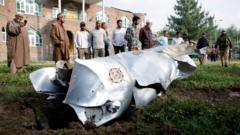In May 2025, escalating tensions between India and Pakistan have prompted Saudi Arabia and other Gulf nations to intervene as mediators. This development is particularly significant given the backdrop of a two-week standoff that followed accusations from India regarding Pakistan's involvement in a terror attack on April 22 in Kashmir. As hostilities increase—with Indian airstrikes targeting locations in both Pakistan and the disputed Kashmir region—the role of Gulf diplomats becomes ever more critical.
Gulf Diplomacy: UAE and Saudi Arabia Step in to Mediate India-Pakistan Conflict

Gulf Diplomacy: UAE and Saudi Arabia Step in to Mediate India-Pakistan Conflict
As tensions flare between India and Pakistan, Gulf States are taking a proactive approach to mediation, filling the void left by the United States.
Saudi Arabia’s foreign affairs minister, Adel al-Jubeir, has actively engaged both nations, visiting New Delhi and Islamabad within days. Meanwhile, Pakistani officials are coordinating with representatives from the United Arab Emirates and Kuwait to stabilize the situation. It’s noteworthy that Iran, another influential player in the region, has also been involved in diplomatic discussions with both countries.
The broader connections between the Gulf states and both South Asian nations lend weight to their mediation efforts. The UAE and Saudi Arabia bolster extensive ties with India through a large expatriate community and mutual economic goals. Conversely, Pakistan has been a longstanding security ally for Saudi Arabia, which has benefited from Pakistan’s military support over the decades.
Historically, the Gulf states have successfully de-escalated tensions in the region. Their interventions in 2019 were pivotal following similar crises, leading to subsequent peace initiatives, including a joint declaration for a cease-fire along the Line of Control. Analysts suggest that the Gulf states’ involvement is not just about prestige; it also serves their own security and economic interests.
As the situation develops, the international community watches closely, hoping that diplomatic efforts from the Gulf can pave the way for a peaceful resolution to the ongoing conflict between India and Pakistan.
Ismaeel Naar is an international reporter for The Times, covering the Gulf states and based in Dubai, UAE.
The broader connections between the Gulf states and both South Asian nations lend weight to their mediation efforts. The UAE and Saudi Arabia bolster extensive ties with India through a large expatriate community and mutual economic goals. Conversely, Pakistan has been a longstanding security ally for Saudi Arabia, which has benefited from Pakistan’s military support over the decades.
Historically, the Gulf states have successfully de-escalated tensions in the region. Their interventions in 2019 were pivotal following similar crises, leading to subsequent peace initiatives, including a joint declaration for a cease-fire along the Line of Control. Analysts suggest that the Gulf states’ involvement is not just about prestige; it also serves their own security and economic interests.
As the situation develops, the international community watches closely, hoping that diplomatic efforts from the Gulf can pave the way for a peaceful resolution to the ongoing conflict between India and Pakistan.
Ismaeel Naar is an international reporter for The Times, covering the Gulf states and based in Dubai, UAE.


















